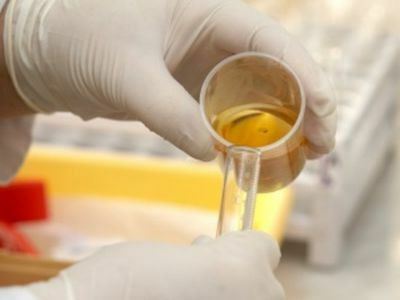What is diurnal proteinuria?
Protein is a substance that acts as a "building material" in our body, getting there together with food. Protein deficiency leads to a number of different syndromes, and, having found in the analysis results a decrease in the level of total protein or albumin, it is necessary to track not only its sufficient intake with food, but also the probable loss. Proteinuria is a phenomenon in which protein is excreted along with urine.

The number of people suffering from kidney diseases is growing every year. And in order to prevent the development of the disease from a minor disturbance, and also to protect oneself from the risk of pathological diseases accompanying kidney diseases, it is necessary to regularly give laboratory tests, including daily proteinuria.
Is the protein in urine normal?
Normal urinalysis in a laboratory study excludes the presence of protein, since its molecule can not physically pass through a hole in the renal membrane. But when it comes to such an investigation as daily proteinuria, the norm can be up to 50 mg. In particular, this often happens if during the collection of material for the laboratory a person actively engaged in physical activities or ate a large amount of protein food. There is also a possibility of error, related primarily to the fact that the analysis for daily proteinuria can be attributed to a protein that has entered the material for isolation or blood.
Damage to the kidneys
Most often, the mechanism of ingress of protein molecules into the urine looks like an increase in perforations in the renal membrane, resulting in the protein leaving the body with urine. Normally, it must filter the protein molecules, not allowing them to get into the urine, returning it back to the blood.

The enlargement of the holes in the membrane occurs at the time of destruction of the kidneys, when the renal tissue gradually cicatrizes. When the amount of replacement tissue is greater than that of the live one, one can speak of a phenomenon such as renal failure, a life-threatening condition requiring regular use of dialysis for blood purification. A disease that leads to nephrotic insufficiency and is characterized by such a symptom as high constant daily proteinuria is most often glomerulonephritis. Less often this process causes pyelonephritis.
Neoplasms
The second reason for the fact that daily proteinuria exceeds normal indices is oncological tumors. Mainly, neoplasms in the kidneys themselves, secondarily - bone marrow or myeloma. With myeloma, the bone tissue is destroyed, and the decay products enter the blood, and through the kidneys into the urine.
Both renal failure and oncology are very serious diseases that are difficult to treat. To maintain health and ability to work can only be achieved by a long and persistent remission. And it is obvious that it is more likely to achieve it at an early stage of the disease, therefore it is very important to conduct urine tests on a regular basis, and if there are abnormalities, contact the nephrologist.
Preparation for analysis of
Analysis of the daily amount of protein in the urine is quite rare, compared with the general analysis of urine. Therefore, not everyone knows how to collect daily proteinuria.

First of all, it is important to prepare a container in which urine will be collected. On average, diuresis of a person is about two liters, so it is better to take a glass three-liter jar. Before using, it should be thoroughly washed in running water with soap, dried and put a marking to determine the exact number of milliliters. Instead of a can, you can use a canister.
For analysis it is extremely important that all urine released per day enter the container. Therefore, for convenience and to avoid that some liquid may pour out, it is better not to urinate in the can itself, but in a small container, for example, a disposable glass, and then pour the urine into a jar or can.
Collection of urine for analysis of
For the laboratory, urine for 24-hour proteinuria is collected exactly for one day, that is, for 24 hours. Thus, starting to collect urine at seven in the morning, the last time you fill the jar is necessary at the same time the next day.
At the same time, the first portion of urine should be taken to the toilet, and all subsequent ones, including the morning one, the next day - in the jar.

After collection, it is necessary to measure the quantity and write it on the leaf or on the direction to the laboratory attached to the urine collection container. This is necessary so that laboratory technicians can calculate the amount of protein in the collected amount of urine, based on its concentration per gram.
How often should I do the analysis?
Daily proteinuria is a study that does not require regular exercise for a healthy person. In most cases, it is the second stage after a general urine test in the event that the first shows traces of protein.
People suffering from chronic kidney disease, glomerulonephritis, pyelonephritis, renal insufficiency, should measure such an index as daily proteinuria, once every 1-3 months. The exact periodicity is established by the doctor nephrologist, based on the stage of the disease, the frequency of exacerbations, the rate of progression, the duration of remission.
Proteinuria in pregnancy
Pregnancy is a period when the colossal load falls on the kidneys. That is why almost every woman during the bearing of a child is faced with the problem of edema. And even if no abnormalities were detected before pregnancy, after its onset the urinalysis - daily proteinuria, can show significant deviations from the norm.
Why is this happening? First of all, for the reason that pregnancy affects the functioning of all body systems, therefore some or other reversible disorders can occur with any organs, including kidneys.

Secondly, during pregnancy, there is often an increase in blood pressure, resulting in increased and intrarenal pressure. This leads to damage to the glomerular membranes, and protein molecules enter the urine. With the normalization of pressure, which usually occurs on its own after the birth, the function and morphological state of the kidneys returns to normal, and the protein in the urine is not detected.
And, finally, proteinuria during fetal gestation may be a consequence of a real disease that manifested itself after the onset of pregnancy. For example, pyelonephritis can occur in remission for many years, until the provoking factor in the form of pregnancy will not cause an exacerbation.
Also, glomerulonephritis sometimes develops asymptomatically, so a person who does not undergo regular medical examinations every year can not guess about the malfunctions in the excretory system of his body. During surveys in the context of observation of childbearing, high daily proteinuria during pregnancy can be found. However, the cause of its appearance will not be in pregnancy, but in kidney disease.
Where to contact after analysis?
After the urine test reveals an increased protein content, it is necessary to reanalyze the analysis to avoid the possibility of an error. For the diagnosis is required at least three results of tests with the revealed pathology, but after the second analysis you can go to the doctor.

Disease, the list of symptoms of which includes proteinuria, is practiced by two specialists: a urologist or a nephrologist. In order to determine to which physician to send the patient, the therapist considers the general picture of the symptomatology. If the protein in the urine is found due to neoplasms in the urinary system, the urologist needs consultation, and if the protein enters the urine due to the reduced filtration capacity of the kidneys, a nephrologist is needed.
In addition to blood tests, questioning the patient to find out his general condition( pain, high blood pressure, swelling), examination and ultrasound, a good result is a study of the protein in the urine, if it is mostly albumin - the problem is the filtration of blood by the kidneys.
How to cure proteinuria?
Proteinuria is not an independent disease, it is a consequence of the pathology of the excretory system of the body, therefore, to reduce or completely eliminate proteinuria, it is necessary to treat the underlying disease.

Power has a significant influence on the reduction of proteinuria. It is important to carefully monitor the amount of protein consumed, its volume in the diet should not exceed 30 percent. It is important to minimize the intake of sodium: the total amount of salt should not be more than 5 grams per day. Until the causes of protein loss are clarified, intensive physical exertion, especially those associated with lifting weights, should be avoided. It is also necessary to prevent viral diseases, so as not to have a large load on the kidneys. Thus, knowing what daily proteinuria is, how to take an analysis, what to do, if the test results exceed the norm, you can protect your health from serious pathologies, choose the optimal therapy plan in time, adjust your diet and lifestyle.
